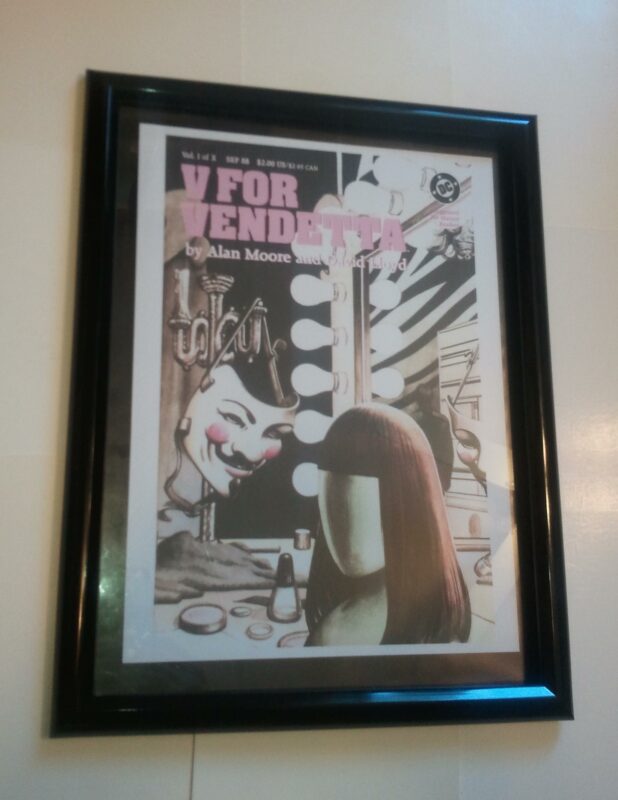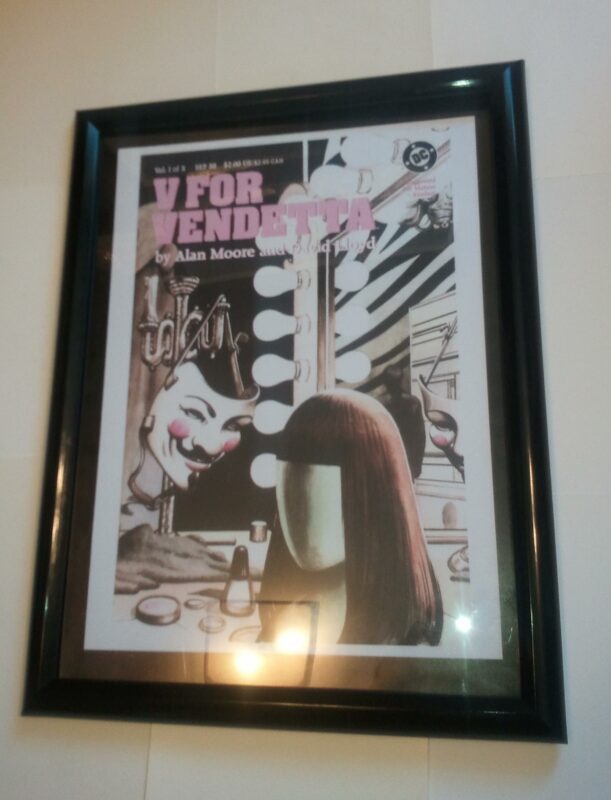Description
You are purchasing the item pictured, framed. Priority mail, tracking and $50 insurance is included with purchase. Item will be bagged to protect from dust, packed in packing peanuts and boxed. Just open box and hang it on the wall…makes a perfect gift!
In 1988, flush with the success of Alan Moore’s epic Watchmen, DC bought the rights to an unfinished Moore-penned saga that had originally run in the black-and-white British anthology comic The Warrior. V for Vendetta – the story of a costumed anarchist revolutionary who wages a war of mayhem on the Fascist government of a near-future England – was completed, colorized and published stateside as a ten-issue limited series in 1988. It was later collected into a trade paperback, which to this day has never gone out of print. David Lloyd’s distinctive art was as much a part of V for Vendetta’s astonishing transatlantic success as Moore’s prolific writing style. It was Lloyd who first came up with the notion that V should wear a mask of Guy Fawkes, who conspired to blow up the House of Parliament in 1605. “I just suggested it to Alan, and he said, “That sounds like a good idea.” It gave us everything, the costume, everything. “The grinning visage of V would become an icon for anarchists the world over. “V’s absolutely of no importance who or what V was under the mask. He isn’t a who or a what, he’s an idea…The whole point of V is that you don’t see who’s behind the mask, and you never do.” – David Lloyd. V for Vendetta is a graphic novel written by Alan Moore and illustrated mostly by David Lloyd, set in a dystopian future United Kingdom imagined from the 1980s to about the 1990s. A mysterious masked revolutionary who calls himself “V” works to destroy the totalitarian government, profoundly affecting the people he encounters. Warner Bros. released a film adaptation of V for Vendetta in 2005. The story depicts a near-future UK after a nuclear war, which has left much of the world destroyed, though most of the damage to the country is indirect, via floods and crop failures. In this future, a fascist party called Norsefire has exterminated its opponents in concentration camps and now rules the country as a police state. V, an anarchist revolutionary dressed in a Guy Fawkes mask, begins an elaborate, violent, and intentionally theatrical campaign to murder his former captors, bring down the government, and convince the people to rule themselves. The two conflicting political viewpoints of anarchism and fascism permeate the story. The Norsefire regime shares every facet of fascist ideology: it is highly xenophobic, rules the nation through both fear and force, and worships strong leadership. As in most fascist regimes, there are several different types of state organisations which engage in power struggles with each other yet obey the same leader. V, meanwhile, ultimately strives for a “free society” ordered by its own consent. David Lloyd’s paintings for V for Vendetta in Warrior originally appeared in black-and-white. The DC Comics version published the artwork “colourised” in pastels. Lloyd has stated that he had always intended the artwork to appear in colour, and that the initial publication in black and white occurred for financial reasons because colour would have cost too much (although Warrior publisher Dez Skinn expressed surprise at this information, as he had commissioned the strip in black and white and never intended Warrior to feature any interior colour, irrespective of expense). In writing V for Vendetta, Moore drew upon an idea for a strip titled The Doll, which he had submitted in 1975 at the age of 22 to DC Thomson. In “Behind the Painted Smile”, Moore revealed that the idea was rejected as DC Thomson balked at the idea of a “transsexual terrorist”. Years later, Warrior editor Dez Skinn allegedly invited Moore to create a dark mystery strip with artist David Lloyd. He actually asked David Lloyd to recreate something similar to their popular Marvel UK Night Raven strip, a story with an enigmatic masked vigilante set in the United States in the 1930s. Lloyd asked for writer Alan Moore to join him, and the setting developed through their discussions, moving from the 1930s United States to a near-future Britain. As the setting progressed, so did the character’s development; once conceived as a “realistic” gangster-age version of Night-Raven, he became, first, a policeman rebelling against the totalitarian state he served, then a heroic anarchist. Moore and Lloyd conceived the series as a dark adventure-strip influenced by British comic characters of the 1960s, as well as by Night Raven, which Lloyd had previously worked on with writer Steve Parkhouse. Editor Dez Skinn came up with the name “Vendetta” over lunch with his work colleague Graham Marsh — but quickly rejected it as sounding too Italian (in fact the word vendetta means revenge in Italian). Then V for Vendetta emerged, putting the emphasis on “V” rather than “Vendetta”. David Lloyd developed the idea of dressing V as Guy Fawkes after previous designs followed the conventional superhero look. During the preparation of the story, Moore made a list of what he wanted to bring into the plot, which he reproduced in “Behind the Painted Smile” : “Orwell. Huxley. Thomas Disch. Judge Dredd. Harlan Ellison’s “Repent, Harlequin!” Said the Ticktockman, Catman and The Prowler in the City at the Edge of the World by the same author. Vincent Price’s Dr. Phibes and Theatre of Blood. David Bowie. The Shadow. Night Raven. Batman. Fahrenheit 451. The writings of the New Worlds school of science fiction. Max Ernst’s painting “Europe After the Rain”. Thomas Pynchon. The atmosphere of British Second World War films. The Prisoner. Robin Hood. Dick Turpin…” The political climate of Britain in the early 1980s also influenced the work, with Moore positing that Margaret Thatcher’s Conservative government would “obviously lose the 1983 elections”, and that an incoming Michael Foot-led Labour government, committed to complete nuclear disarmament, would allow the United Kingdom to escape relatively unscathed after a limited nuclear war. However, Moore felt that fascists would quickly subvert a post-holocaust Britain. Moore’s scenario remains untested. Addressing historical developments when DC reissued the work, he noted: “Naïveté can also be detected in my supposition that it would take something as melodramatic as a near-miss nuclear conflict to nudge Britain towards fascism… The simple fact that much of the historical background of the story proceeds from a predicted Conservative defeat in the 1983 General Election should tell you how reliable we were in our roles as Cassandras.” David Lloyd is a British comics artist best known as the illustrator of the story V for Vendetta, written by Alan Moore. Dez Skinn set up Warrior magazine in 1982; he asked Lloyd to create a new pulp character. Lloyd and writer Alan Moore (who had previously collaborated on several Doctor Who stories at Marvel UK) created V for Vendetta, a dystopian adventure featuring a flamboyant anarchist terrorist fighting against a future fascist government. Lloyd, who illustrated in cinematic chiaroscuro, devised V’s Guy Fawkes-inspired appearance and suggested that Moore avoid captions, sound effects and thought balloons. After Warrior folded in 1984, the series was reprinted and continued in colour by DC Comics and collected as a graphic novel in 1995. It was adapted into a film released in 2006. The stylized Guy Fawkes mask that Lloyd created for V for Vendetta has transcended the story and made its way into the real world, frequently being used by protesters demonstrating against the perceived injustices of governments, cults, financial institutions and other powerful organizations. Anonymous is a loosely associated international network of activists and hacktivists. A website associated with the group describes it as “an internet gathering” with “a very loose and decentralized command structure that operates on ideas rather than directives”. The group became known for a series of well-publicized hacks and distributed denial-of-service (DDoS) attacks on government, religious, and corporate websites. Anonymous originated in 2003 on the imageboard 4chan, representing the concept of many online and offline community users simultaneously existing as an anarchic, digitized global brain. The group is also associated with the satirical open wiki Encyclopedia Dramatica. Anonymous members (known as “Anons”) can be distinguished in public by the wearing of stylised Guy Fawkes masks.
>PAN>Frame is shrinkwrapped until time of purchase. Ships boxed with packing peanuts.
THE PERFECT GIFT!
Related products
-
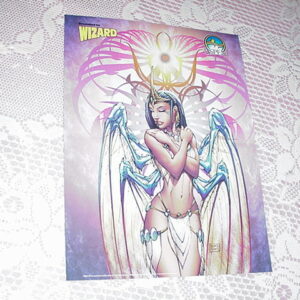
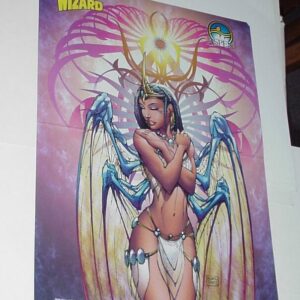
Soulfire Poster # 1 Grace by Michael Turner Fathom
$39.99 Add to cart -
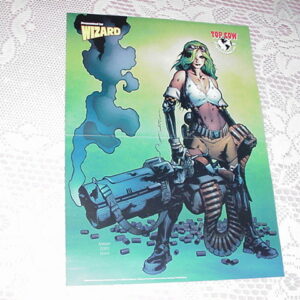
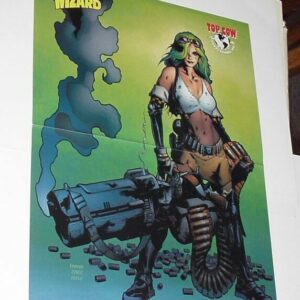
Aphrodite IX Poster # 2 by Trevor Hairsine Image
$29.99 Add to cart -
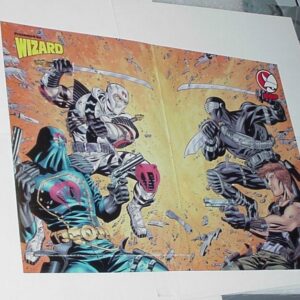
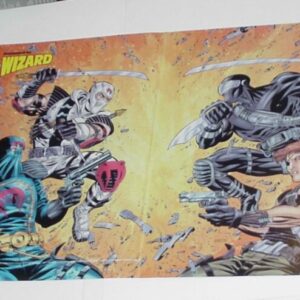
G.I. Joe Poster # 3 Cobra Commander Storm Shadow vs Snake Eyes and Billy by Mike Zeck
$34.99 Add to cart -
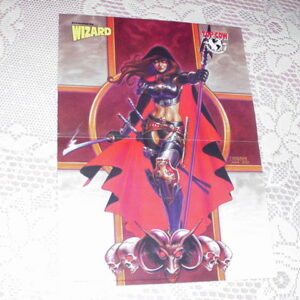
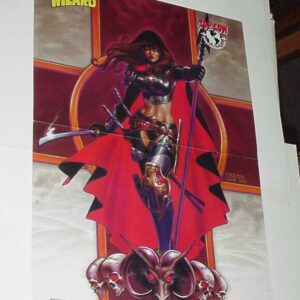
Magdelena Poster Joe Michael Linsner Dawn
$34.99 Add to cart
